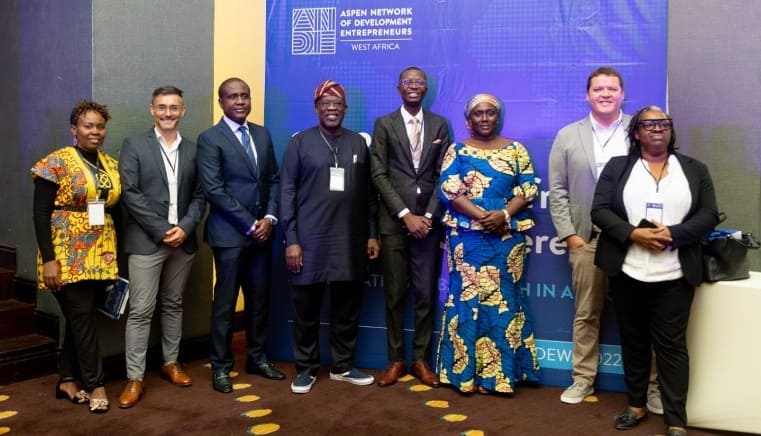The US based Aspen Institute of Development Entrepreneurs (ANDE) in partnership with Impact Investing Ghana (IIG) hosted West Africa’s leading Investors, Entrepreneurship Support Organizations and Entrepreneurs to promote better connections and support entrepreneurial ecosystem growth.
At the end of the annual West Africa Regional conference in Accra, on the theme “Accelerating Small and Growing Business Growth in Africa”, Kyle Newell, Managing Director, Aspen Network of Development Entrepreneurs said:
“West Africa’s entrepreneurial ecosystem is robust and innovative. The 2022 ANDE West Africa Annual conference strengthened network partnerships and the ANDE West Africa Conference will continue to elevate the entrepreneur’s voice, strengthen connections across Francophone and Anglophone and build solutions to address the needs of the entrepreneurial ecosystem especially in the private sector. Together, we will “Accelerate the growth of SGBs.”
The fifth annual West Africa regional conference featured interactive sessions on topics like gender equality, climate and environmental action, decent work, economic growth, focusing resources on earlier stage support for Small Businesses, and reestablishing a sustainable entrepreneurial ecosystem post-COVID.
In a keynote address, Mr. Michael Mensah-Baah, Deputy CEO of Development Bank, Ghana said “We hope to support everyone and will not limit ourselves to some specific SMEs. We will make sure that once we give out the loans, it will be utilised in a way that supports the growth of the SME so that in the end, we will see transformation of the private sector in Ghana”, Mr. Mensah- Baah assured.
Hamdiya Ismaila, a board member of Impact Investing Ghana, brought up the lack of information for small and emerging enterprises in Ghana during the inaugural plenary to address enhancing the business environment for African enterprises. Additionally, she advised funders and foundations to give priority to private sector-led enterprise development and technical assistance providers.
Other prominent speakers from the sector, such as Jimmy Bettcher, Constance Swaniker (Accents and Arts, DTI, Impact Investing Ghana), Amma Gyampo (ScaleUp Africa, Impact Investing Ghana), and investor Baafuor Otu Boateng (I&P), firmly echoed this sentiment (Partners in Food Solutions).
They argued that lowering due diligence expenses, enhancing the investment pipeline, and providing longer-term funding for private technical assistance service providers were crucial to the ecosystem’s overall performance, including the level of SME Growth investments.
“Entrepreneurship Education and Support is an essential part of the solution mix for our industry. It must be taken more seriously by funders as it would make the work of investors much more efficient.”
Mr. Kofi Ofosu Nkansah, Chief Executive Officer of NEIP, outlined how the National Entrepreneurship & Innovation Program (NEIP), a government program in charge of providing integrated national support for SMEs and startups, focuses on giving young people chances through business support programs.
The attendees also saw a demonstration of the UN International Trade Centre’s efforts to digitalize conventional MSMEs, create links to national and international business and investment prospects, and construct resilient business models.
“Investors and ecosystem players who are really making a difference not just in Ghana but across Africa attended this conference and we at UN ITC are excited to showcase top agriculture and tech SMEs. We are here to help all businesses grow, internationalize them and really look into how we can get the agribusinesses and tech startups to new markets,” said ITC National Coordinator for Ghana, Isaac Newton- Acquah.
Tenemba Anna Samake, Chair of the Steering Committee of ANDE West Africa, stated that ANDE as an organization helps enterprise support organizations.
She reaffirmed that because they are ANDE members, development partners like USAID and FMO, among others, are in a good position to discuss the problems in West Africa and the most effective ways to address them.
The two-day in-person conference gave attendees the chance to interact with some of Africa’s top leaders, practitioners, and visionaries while networking, collaborating, and learning.









